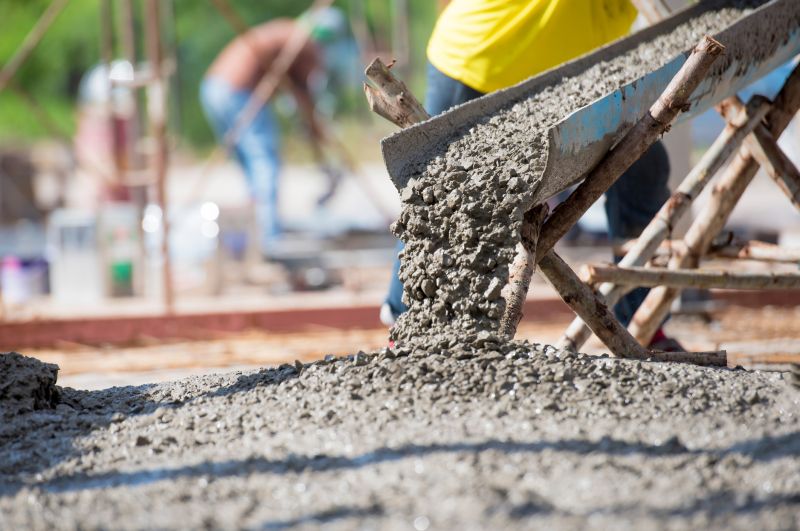Top-Rated Products For Concrete Service Tasks And Projects
Identify the most highly-rated tools and materials that help achieve professional-grade results in concrete applications.
 Concrete service projects often require a diverse range of products to ensure quality, safety, and durability. From surface preparation to finishing touches, selecting the right tools and materials can significantly impact the outcome of a project. Properly prepared surfaces are essential for achieving optimal adhesion and longevity, making products like surface cleaners, etching solutions, and bonding agents vital components in the workflow. Additionally, safety gear such as gloves, masks, and protective eyewear help safeguard workers during handling and application.
Concrete service projects often require a diverse range of products to ensure quality, safety, and durability. From surface preparation to finishing touches, selecting the right tools and materials can significantly impact the outcome of a project. Properly prepared surfaces are essential for achieving optimal adhesion and longevity, making products like surface cleaners, etching solutions, and bonding agents vital components in the workflow. Additionally, safety gear such as gloves, masks, and protective eyewear help safeguard workers during handling and application.
Top Overall Option
Concrete Surface Preparation Kit
A comprehensive concrete surface preparation kit includes essential tools such as grinders, scrapers, and cleaning agents designed to clean, etch, and prepare concrete surfaces effectively. This all-in-one set simplifies the process of readying surfaces for coatings, repairs, or overlays, ensuring better adhesion and a smoother finish. Its versatility makes it suitable for both professional contractors and serious DIYers seeking reliable results.
Types of Products For Concrete Service
Concrete Surface Cleaners
Products designed to remove dirt, stains, and debris from concrete surfaces to ensure proper adhesion and finish.
Concrete Etching Solutions
Acid-based or neutral etching products used to roughen concrete surfaces for better bonding of coatings.
Patching and Repair Compounds
Materials formulated to fill cracks, holes, and damaged areas in concrete for restoration and reinforcement.
Concrete Sealers
Protective coatings that help prevent moisture penetration, staining, and surface wear.
Curing Blankets and Covers
Materials used to retain moisture during the curing process, promoting proper strength development.
Concrete Bonding Agents
Adhesives applied between old and new concrete surfaces to improve bonding strength.
Power Mixers and Drills
Equipment used for mixing concrete, mortar, or applying other compounds efficiently.
Trowels and Floats
Tools essential for finishing and smoothing freshly poured concrete surfaces.
Surface Profilers
Devices used to measure and ensure proper surface roughness for coatings or overlays.
Waterproofing Membranes
Materials applied to prevent water ingress and protect concrete structures.
Surface Grinding and Polishing Tools
Equipment for smoothing and polishing concrete surfaces to achieve desired aesthetic or functional qualities.
Concrete Vibrators
Tools used to eliminate air pockets during pouring, ensuring dense and uniform concrete.
Expansion Joints and Sealants
Materials to accommodate movement and prevent cracking in concrete slabs.
Concrete Dyes and Colorants
Products used to add color or decorative effects to concrete surfaces.
Form Release Agents
Substances applied to molds to facilitate easy removal and prevent sticking.
Concrete Cutting and Drilling Equipment
Tools for precise cutting, grooving, or drilling into hardened concrete.
Popular Choices
Widely used for preparing surfaces before coating or repair work, ensuring cleanliness and proper bonding.
Popular for protecting surfaces from stains and wear, extending the lifespan of concrete structures.
Commonly selected for fixing cracks and holes to restore structural integrity.
Essential finishing tools that are frequently used in both professional and DIY settings.
Often chosen to prepare surfaces for coatings, enhancing adhesion.
Popular for maintaining moisture during curing, especially in hot or dry conditions.
Commonly applied in foundations and slabs to prevent water intrusion.
Used frequently to measure surface roughness for optimal coating application.
Chosen for ensuring dense, uniform concrete pours by removing trapped air.
Popular for managing movement and preventing cracks in large slabs.
Used for decorative purposes and aesthetic enhancements.
Commonly applied to molds for clean removal and surface quality.
For those involved in concrete repair or new construction, specialized products like patching compounds, sealers, and curing blankets are frequently used. These materials help restore damaged areas, prevent moisture ingress, and promote proper curing conditions. Equipment such as trowels, screeds, and power mixers also play crucial roles in shaping and finishing concrete surfaces efficiently. When choosing products for concrete service, it is important to consider their compatibility with existing materials, ease of use, and the specific requirements of the project.
Overall, investing in quality products tailored for concrete work can lead to better results and longer-lasting structures. Whether undertaking small repairs or large-scale installations, understanding the variety of available products and their applications helps ensure a smooth workflow. By selecting appropriate tools and materials, professionals and DIY enthusiasts alike can achieve a professional finish and enhance the durability of their concrete projects.
Key Buying Considerations
- Compatibility with existing concrete and surface conditions
- Type and purpose of the product, such as repair, sealing, or finishing
- Ease of application and required tools or equipment
- Drying or curing time to plan project timelines
- Durability and resistance features suitable for the environment
- Safety features and proper handling instructions
- Coverage area to ensure sufficient quantity for the project
- Shelf life and storage requirements
- Cost-effectiveness and value for the scope of work
- Brand reputation and product reviews
- Availability of technical support or customer service
- Environmental conditions during application, such as temperature and humidity
- Compatibility with other products being used in the project
- Surface preparation requirements before application
- Post-application maintenance or reapplication needs
This page contains affiliate links. We may earn a commission if you make a purchase through these links, at no additional cost to you.
